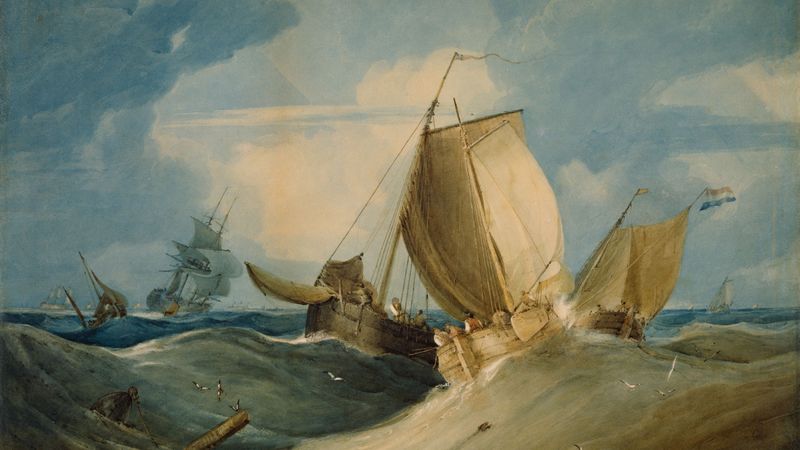The best stories come from boats. Tales of threatening gale winds and thousand-pound tunas are never blasé. Yet old fishermen are not on their oath when they reminisce about the weather they fought or the fish they caught in their youth. The annals of early modern Protestantism are also filled with stories—both striking and true—of boats and fish and seafarers. Maritime matters were everywhere in the world, because water made possible the movement of goods, ideas, and people—not least refugees. In what sense, then, can watercraft offer a key to the religious culture of the time?
Permit some examples. John Knox is remembered as a leader of the Reformation in Scotland and a founding father of Presbyterianism. Before he preached at St. Giles in Edinburgh, and before his exiles in England, Geneva, and Frankfurt, he survived nineteen months between 1547 and 1549 as a forsare or galley slave, pulling an oar on the French ship Notre Dame as it sailed from the North Sea to Nantes in Brittany to the Loire River and back. When he retold the story, he highlighted the experience as formative for his fellow Scots prisoners in learning to keep the faith amid hardships, mental and physical.[1] When Catholic shipmen sang the Salve Regina, the hymn to the Blessed Virgin Mary, the Scots donned, rather than removed, their caps; then they pulled their caps over their ears to block the sound. When the ship’s officer brought on deck a painted image of the Virgin for each member of crew to kiss, an unnamed Scot—almost certainly Knox himself—refused, whereupon the officer thrust it into his face. In Knox’s words, the man “took the idol, and advisedly looking about, he cast it into the river and said, ‘Let our Lady now save herself: she is light enough; let her learn to swim.’”[2]
In 1497, Pope Alexander VI’s son Giovanni Borgia went missing. When the distraught father ordered the dragging of the Tiber River, Renaissance poet Jacopo Sannazaro quipped that, at last, the pope had become a “fisher of men.”[3]
From the 1530s to the 1550s, Philip Melanchthon received multiple invitations to England.[4] He accepted none of them. True, he remained committed to Wittenberg and the Saxon elector did not want to see him go. But Melanchthon had also resolved to avoid the sea. When he was a boy, his father asked a celebrated astronomer at the court of the Elector Palatine to read Philip’s horoscope, which announced that he would be shipwrecked.[5] The Reformer was not a stoic, but he was interested in the stars, so he kept his distance from the English Channel for good measure.
In 1589, Dr. Paul Luther, the third son of Martin Luther and Katharina von Bora, traveled on a passenger ship on the Elbe River—a boat of promise. Onboard, he struck up a conversation with Johannes Letzner, a Lutheran pastor historian who had devoted his life to collecting remnants of the German past. The topic came naturally: Martin Luther’s literary remains. Paul told Letzner that a few years earlier, he found the original manuscript of Luther’s commentary on one of the Pauline Epistles. He read it, realized its worth, and had it specially bound—his most valuable possession next to his Bible. When Paul Luther died, his sons sold many of their grandfather’s books and papers to Joachim Friedrich, margrave of Brandenburg. Some of the material was subsequently housed, and therefore preserved, in the Electoral Library in Berlin, including Luther’s commentary on Romans—possibly the very manuscript discussed on the Elbe.[6]
The Edict of Nantes of 1598 brought peace to France after years of religious civil wars. Under the terms, the Reformed could worship in certain French cities, but no closer than five leagues from Paris. So, many French Huguenots traveled on the Seine River to attend church. On one such expedition, Isaac Casaubon, the great classical philologist, and his family were forced to make use of a leaky rowboat because all other boats were full. Halfway to their church, they were accidentally rammed by a barge pulled by two horses. Their skiff took on water and began to sink. Casaubon’s sons and sister scrambled into the barge, while he and his wife nearly drowned. When he finally made it to church—in time for the second service—he realized he had lost his favorite psalter in the water. He had given it to his wife as a wedding present and used it regularly for twenty-two years. Looking at a man seated in front of him, he recalled, “I peeked at his book so that I could join those singing the psalm. By chance they were singing the later part of Psalm 86. ‘Pulling my life from the depths, from the lowest tomb of the dead.’ I thought immediately of what Saint Ambrose says: ‘This is the peculiarity of the Book of Psalms, that everyone can use its words as if they were peculiarly and individually his own.’”[7] Maritime vignettes offer another perspective to Reformation life, with undertows of meaning.
Zachary Purvis (DPhil, University of Oxford) is lecturer of church history at Edinburgh Theological Seminary. He is the author of Theology and the University in Nineteenth-Century Germany (Oxford: Oxford University Press, 2016).
2. Knox, History, 1:108.
3. Jacopo Sannazaro, Opera omnia latine scripta (Venice, 1535), fol. 42r.
4. Charlotte Methuen, “The English Reformation in Wittenberg: Luther and Melanchthon’s Engagement with Religious Change in England 1521–1560,” Reformation & Renaissance Review 20 (2018): 209–34; B. L. Beer, “Philip Melanchthon and the Cambridge Professorship,” Notes & Queries 232 (1987): 185.
5. Philip Melanchthon to Johannes Mathesius, July 30, 1557, in Melanchthons Briefwechsel. Kritische und kommentierte Gesamtausgabe. Regesten, ed. Heinz Scheible, vol. 8 (Frommann-Holzboog: Stuttgart-Bad Cannstatt, 1995), no. 8288.
6. Martin Luther, D. Martin Luther’s Werke. Kritische Gesamtausgabe, vol. 56 (Weimar: Hermann Böhlaus Nachfolger, 1936), 13ff.; Johannes Ficker, ed., Luthers Vorlesung über den Römerbrief 1515/1516 (Leipzig: Theodor Weicher, 1908), 1:vii–xvi.
7. Isaac Casaubon, Ephemerides, ed. John Russell (Oxford: Oxford University Press, 1850), 2:618–21.







